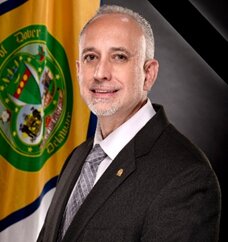Lewis: Sustainable solution to homelessness needed
Dover City Councilman Brian E. Lewis represents the 2nd District. He is also chair of the Safety Advisory and Transportation Committee.
As one of your elected city leaders, I think that it is important to keep the public aware of the current homelessness issue in our community. On Jan. 25, members of the community came out to the meeting of the Safety Advisory and Transportation Committee, which I chair, to give testimony about the homeless crisis in the city of Dover. As many are aware, homelessness has been one of the most difficult and complicated problems Dover City Council has ever been asked to solve. My colleague, 4th District Councilman Roy Sudler, made a request to place the issue of homeless tent camps on the committee agenda, due to safety concerns on College Road, where a tent camp has been put up next to Delaware State University. At the meeting, there were advocates from both sides — one side saying that we do not have affordable-housing resources, camping should be tolerated, and more shelters are needed with better mental health resources. Conversely, there are property owners and business owners saying that they pay a large portion of the city’s taxes and expect the city to enforce the law. There are clearly different views on how to address Dover’s homeless crisis.
People in Dover believe that the city is not doing enough to battle homelessness, while others say it is not equipped to handle the daily issues of the homeless, not just the issue of them being on the streets. Some of my colleagues on council say that “to combat these issues, it needs to happen on the state level. The city is not a social service agency.” In addition, some say many homeless people have been offered help but turn it down.
For me, it comes down to doing something instead of nothing and finding a reasonable solution for both sides. I find it heartbreaking to see many people, including our nation’s veterans and children, shivering in the cold and trying to find a warm place to sleep. What further disturbs me is, as the homeless population noticeably increases throughout the city of Dover, there is inadequate response by local and state leaders to the surging crisis. In 2017, when serving on City Council, I was asked to work with other community members on the Mayor’s Blue Ribbon Panel on Homelessness to end homelessness in the city of Dover. At the time, there were many ideas and proposals that were brought to the table, to include creative solutions for additional resources; exploring “outside–the–box” thinking, particularly strategies that other cities have used; and enhancing partnerships with nonprofits and houses of worship. The final commission report was submitted to the mayor for review and action. Yet, today, we see no change but a situation that has gotten worse since 2017.
People suffering from homelessness in America have been documented as far back as 1640, and, as a child, I was exposed to it when my father took me to visit New York City back in the 1970s. I would see homeless people out walking the streets, mainly in the Bowery area. Seeing this had an impact on me wanting to help those in need. I have been serving the homeless population for over 20 years, through volunteering at the Dover Interfaith Mission for Housing, Code Purple and out on the street. I previously served on the board of directors for DIMH, as part of governing and setting strategies for the shelter. Those who are homeless often fit three of the major categories: mental illness, addiction or poverty. As an active participant in assisting the homeless, I see one of the biggest obstacles being limited mental health resources and services. Poor mental health is both a cause and consequence of homelessness. It is reported that an estimated 20%-25% of the U.S. homeless population suffers from severe mental illness, compared to 6% of the general public.
Now, we can continue to create committee after committee after committee and shelf the issue, while the dilemma continues, or ban together as a community and demand pathways to success. Everyone must exert equal effort. What we need is direct public support and interaction with the homeless on the street. Given the urgency of the situation, I believe the state and local government must respond right now.
I think it may be time for our governor to appoint a czar to lead and coordinate all agencies and parties involved, with the primary goal to provide enough temporary housing and services to people on the street, to get them back to self-sustaining, normal lives.
There may be a lot of work ahead of us, but you really don’t know how much you can do until you stand up and decide to try.
Reader reactions, pro or con, are welcomed at civiltalk@iniusa.org.







